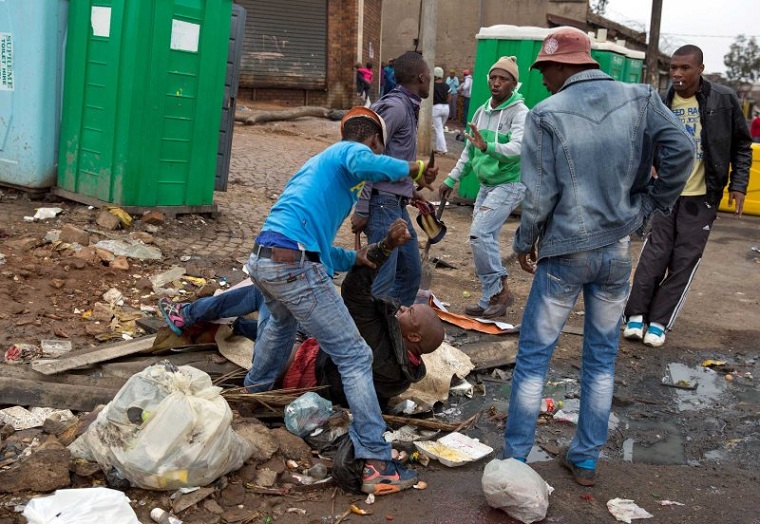
Mozambique national Emmanuel Sithole is attacked by men in Alexandra township during anti-immigrant violence in Johannesburg April 18, 2015. He later died of his injuries. Zimbabwean President Robert Mugabe on Saturday expressed shock and disgust at attacks on immigrants in neighbouring South Africa and said his government was working to bring back home affected Zimbabwean citizens. At least four people have been killed in a wave of anti-immigrant violence in South Africa that started two weeks ago in the port city of Durban and spread to Johannesburg. REUTERS/James Oatway/Sunday Times ATTENTION EDITORS – FOR EDITORIAL USE ONLY. NOT FOR SALE FOR MARKETING OR ADVERTISING CAMPAIGNS. THIS IMAGE HAS BEEN SUPPLIED BY A THIRD PARTY. IT IS DISTRIBUTED, EXACTLY AS RECEIVED BY REUTERS, AS A SERVICE TO CLIENTS. NO ARCHIVES. NO SALES. NO ONLINE USE. SOUTH AFRICA OUT. NO COMMERCIAL OR EDITORIAL SALES IN SOUTH AFRICA TPX IMAGES OF THE DAY
As the coronavirus outbreak has slammed the South African economy and pushed unemployment to a 17-year high, it’s awakened a recurrent social demon: xenophobia.
Anti-immigrant groups have staged demonstrations in recent months in Johannesburg, the biggest city, and in Pretoria, the capital, demanding the mass deportation of foreigners.
The provincial government of Gauteng, the nation’s economic hub, wants to pass a law next year to limit ownership of businesses in low-income areas, known as townships, to South African citizens and foreigners who are fully legalised.
That threatens to upend an industry of convenience stores numbering over 100 000 nationwide with annual revenue of US$6.8 billion, according to GG Alcock, a consultant on township marketing and an author of books on the informal economy.
“Every foreign national that came to our country since 1994 must be deported,” said Victoria Mamogobo, the 34-year-old chairwoman of the South Africa First party, as she demonstrated on 27 November with a group waving national flags and banners in downtown Johannesburg.
“You’ve got people all the way from Nigeria who are here to sell tomatoes on our streets. How is that helping us grow our economy?”
Since the apartheid system of racial discrimination ended in 1994, Africa’s most developed economy has been a magnet for migrants from the continent and as far afield as Bangladesh.
That’s sparked bouts of violence every few years, with mobs attacking and looting shops and killing foreigners — the most extreme instance in 2008 left 60 people dead and another 50 000 displaced. Today, social media helps whip up the hatred.
A barrage of criticism following clashes between locals and immigrants in 2019 prompted President Cyril Ramaphosa to dispatch envoys to other African countries to calm tensions.
Many of the migrants are refugees, legally in the country and allowed to work. Some are economic migrants — many undocumented — and others, including hundreds of thousands of Zimbabweans, have been given work permits.
While it’s unclear how many migrants are in South Africa, estimates of the number of Zimbabweans alone exceed 2 million.
Still, with South Africa’s economy set to contract by the most in nine decades this year, unemployment at 31% and local elections scheduled for 2021, some politicians have found blaming foreigners for everything from joblessness to poor public services is a vote winner.
Continued next page
(77 VIEWS)


